Top 10 Money Saving Tips for Long Term Travel 2013
After more than 20 months on the road I thought I’d share our top 10 ways to spend less on long term travel. People we meet are often surprised that it costs us less to live this ‘location independent’ lifestyle than it does to live in the UK. Well, it is true. With the exception of perhaps Singapore, everywhere we’ve been has cost us less than living at home. We no longer run a house or car and everything from food to clothes is generally more affordable here in Asia.

1 million Laos Kip (£84)
1) Get The Best Accommodation for You, Not Necessarily The Cheapest
A place to lay your head for the night is likely to take the biggest chunk of your daily budget. Now, conversely, for a post about moneysaving I’m not going to say to get the cheapest room you possibly can, let me explain why. The cheapest rooms are often quite horrible. We have seen many that we would not have liked to stay in with stained sheets on the bed, mould or unidentifiable substances on the walls and proportions that would have you climbing those dirty walls in minutes. We have stayed in such places for a night or two in some cases, (although I always make quite a fuss if the bed is dirty) just until we sourced something better; however, we usually have a certain set of expectations. We have our own bathroom, a clean looking bed, a window and wifi as often as possible. Rooms get extra points for having a desk and a chair, being a bit away from noisy areas, having some furniture and looking like they’ve been painted in the last year or two.
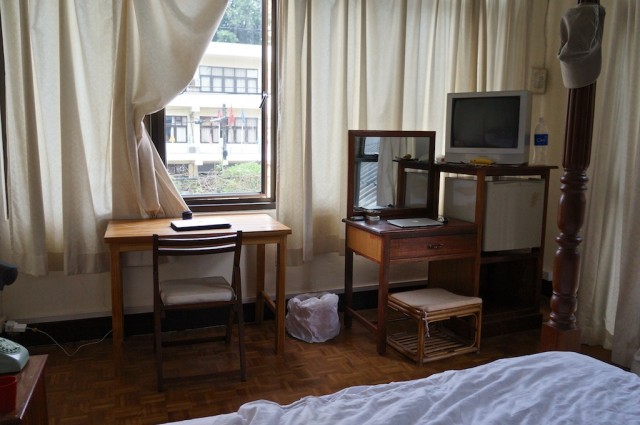
Our hotel room here in Vientiane, Laos – it has a four poster bed, two desks and everything else on our list and costs just £1.20 / night more than most of the tiny hostel rooms in town with a shared bathroom
When you have a horrible room you don’t want to spend any time there. That makes you go out and spend more money. When there is no wifi in the room you are forced to go to a coffee shop just to check your email. When using a shared bathroom you can’t linger and enjoy a hot shower or give your trousers a good soaking in the sink (see point 7.) A nasty room can make you a bit depressed, another thing that might make you go out and spend more money in drowning your sorrows (see point 8.) We’ve had days when we’ve not left our room and it has usually been a lovely break. Films on the laptop (or sometimes cable TV), games and generally relaxing in your pants are great free entertainments that you would not want to do in a questionable room.
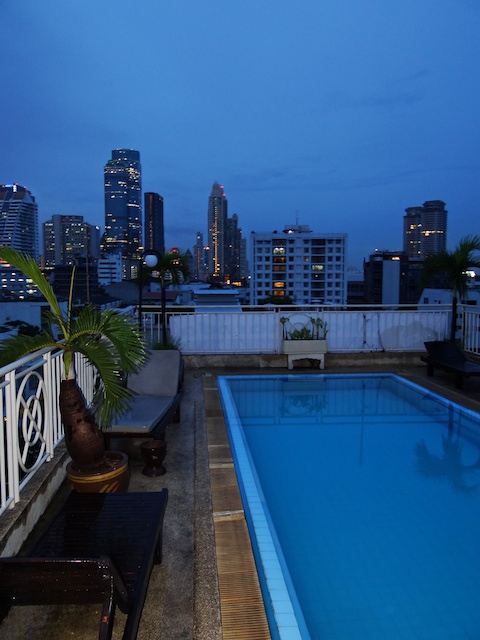
Picture of the pool on the roof of the Sathon Saint View Apartments in Bangkok, where we stayed for a month – saving loads on the price of a nightly room rate.
You should find a room that has everything you need and is a pleasant enough place to be and then try and get a discount. Unless it is a really busy time when the hotel can expect to be fully booked they will often be flexible, especially if you ask with a smile. The main way we save money on accommodation is actually the subject of tip 2…
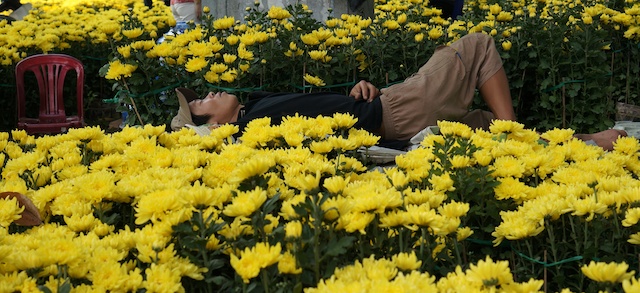
Negotiating a discount on a room to rest your head might be more tricky during a holiday like Tet in Vietnam – picture from the Tet flower market in HCMC 2013
2) Slow Down! See More, Save More
We always usually negotiate at hotels and guesthouses with the line “what about if we stayed for a week?” Having a room full for a week with a guaranteed income is often preferable to 2 nights full and 5 nights empty to owners and managers and they will often happily slash the room rate for us. Longer term is even better: agreeing to stay for a month and paying in advance or signing a contract of some sort can result in a higher standard of accommodation at almost half the cost of paying by the night. (See my post about how we came to stay in this amazing flat in Benaulim for less than the cost of a tiny room if you need any convincing) The other major benefit of renting somewhere with a kitchen is that you are able to cook your own food – a major saving.

This is just the living room of the apartment we had in Benaulim for a month; we also had a bedroom, a bathroom, a fully equiped kitchen, two balconies and use of a lovely pool
Also, moving around (be it on busses, coaches, trains, planes, ferries, taxis or tuk tuks) always costs money. The less often you do it, the less you pay out.

Henry playing cricket with some kids in Mumbai (and a tiny bat!) because we had two weeks there we had time to do things like that
Aside from the obvious financial benefits of ‘slow travel’, staying in one place for more than a couple of days allows you to really get a feel for the area, the food, the culture and the people. You can wander around (for us that means snapping dozens of photos) without rushing to tick the ‘must see’ things off your list. You can sit in a park for the afternoon or drink beer with the locals at the roadside without worrying about making that next connection. We spent 2 weeks in Siem Reap in Cambodia and didn’t get around to seeing the Angkor temples until right near the end of our time there. We were too busy exploring the local wats and chatting to monks to get there. We would never had had that experience had we rushed in, seen Angkor and rushed away again.

Wandering around without time constraints allows you to observe scenes like this in Siem Reap, Cambodia
Finally, all the rushing around that people do when they are trying to squeeze “all of south east Asia” into 6 or so months is so tiring! It is hard to keep up the pace. If you must plan (and we don’t particularly recommend it) don’t plan a 1 day here, bus, 2 days there, train, 1 night here, flight etc as you will find it expensive and pretty hard on your body and soul after a while.
3) Cut Transport Costs
Costs can be reduced by carefully considering the mode of transport as well as by reducing the frequency of travel. When possible, try to use public transport. You often get a more memorable, authentic experience than if you were to take a taxi and the savings can be enormous.

Using public transport is often a pleasure – like the BTS system in Bangkok
Consider your options and if it is local – walk it! Walking is free, healthy, and by walking the streets (or dusty paths) you get to see the real life goings on of your host country. This applies not just to those traveling long term but even holidaymakers on short two week breaks. Getting bussed from here to there with a tour group, ripped off by a tuk-tuk or insulated from the heat in an air-conditioned taxi is getting a sterilised view of things. Hopping from one polished tourist attraction with over-priced food and drinks to the next you really do miss seeing what makes a place special.

A Jeepney in Angeles City – the Philippine version of a bus
Or, get on your bike! Hiring a bicycle is cheap, you can cover greater distances than on foot and you get some cooling wind in your hair action while you’re at it.
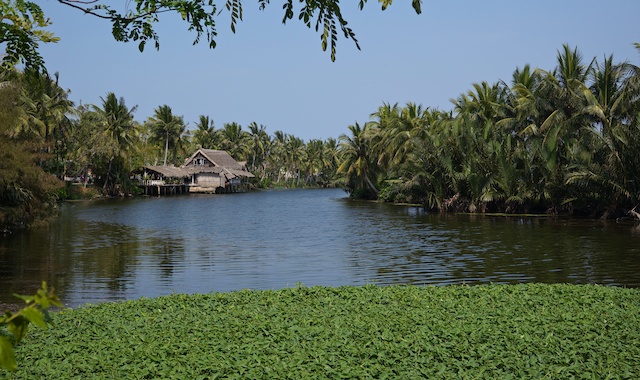
Taken on one of my bike rides to the outskirts of Hoi An, Vietnam
4) Haggle, Negotiate, Bargain and Do a Deal!
It is not rude to barter and it can save you a lot of money. I’m not able to calculate how much we’ve saved but it is in the hundreds of pounds, if not more. I’m not just taking about when you buy a pretty scarf from the market. I’m taking about saving money on accommodation, even when there is a price list clearly displayed. I’m talking about standing your ground with tuk tuk drivers who try to get what is probably equal to their fare for a whole average day from a 10 minute trip. I’m talking about not taking the first price that is given to you for basics like water and soap in small shops where the price is often made up depending on what you look like. Mostly, I’m talking about knowing what something should cost in the local economy you find yourself in.
I know this is a somewhat controversial topic. Many people are of the mind that “it is still much cheaper than what we would pay at home” well yes, it probably is, but why on earth should we, the traveller, still pay the massive, premium ‘having a laugh’ price that is asked of us in some heavily touristed areas? Vietnam was our home for 6 months before we came here to Laos. We stayed mostly in areas that attract quite a few visitors. I soon knew what a big bottle of water should cost and unless we were somewhere remote I did not pay the silly prices that were asked of us. I remember one shop in Hue tried to charge 25,000 VND (£0.79) for 1.5 litres of water, the normal small shop price was 5,000 (£0.16) and the supermarket price about 3,500 (£0.11). Is that much of a saving? Well, it is if you add it up over the course of our journey, you have to drink water everyday. Even on just that day, a saving of 20,000 VND was enough for 2 coffees from a local cafe.
You need to develop your shopping confidence to say “no”. My line in a rip-off situation is usually “you’re joking me!” with a smile on my face and I get out what I know it should cost or walk away. Should I have paid the £2.18 (70,000 VND or $3.31 US) asked by a fruit seller in Hoi An for just 5 little bananas? Or watch as the (local) person before us in the queue buys 4 small bottles of water and then silently pay up when you’re given the same price for just one? This lady will not be one of those tourists! The more people that obligingly or unthinkingly pay whatever is asked of them, the longer this sort of thing will continue. I’ve done most of the everyday shopping on our trip (Henry says I’m better at it and I do enjoy getting a bargain) and I can say I think the stall holders, shop keepers etc actually respect you more when you know what things should cost. They wouldn’t sell it to you at a loss so haggle away, you have nothing to lose and cash in your pocket to gain. Oh, and always do it with a smile, you’re far more likely to get results.

Henry having a laugh with a lady in HCMC, Vietnam
5) Buy Good Stuff and Look After It
Long term travel (especially with hand luggage only) takes a toll on your belongings. If it is poor quality you will need to replace it, and that costs money. We’ve been very lucky with everything we’ve bought with very few exceptions. Henry still has his original North Face ‘Recon’ backpack and it is showing no signs of wearing out (even after 86 weeks and 8 countries) and I only replaced my Caribee backpack as I wanted one with wheels. Our Eagle Creek packing cubes look as good as the day we left home and our sturdy, sensible sandals (second pair each now) are lasting very well indeed.
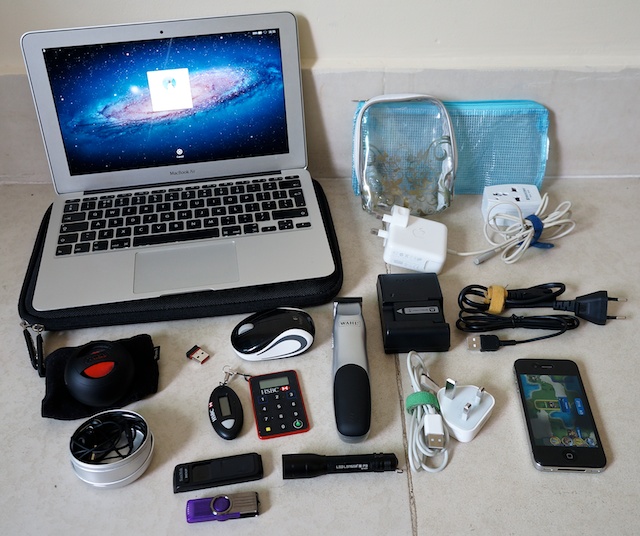
Henry’s Tech, for full list see our Packing List page
We both have 11″ MacBook Air laptops (we were Mac users before travelling) and we could not be happier with them. Our cameras are not the ones we left home with but that is because we wanted to upgrade them. Only 2 gadgets have given up the ghost. Firstly, Henry’s Sony Experia Mini could not cope with the heat in India but we managed to part exchange that for another phone and my second-hand 3rd gen. iPod no longer turns on after I neglected to charge it for months having been using my iPhone for all things audio. If we’d had cheap notebooks or phones, flimsy backpacks or left any of our things on display in the room for an opportunistic thief to help themselves to we may well have had to shell out for replacing stuff by now. As it is, we’re happy with what we’ve got and as we have so few belongings we rightly treasure and look after everything, down to the last earplug.
6) Eat Like a Local

One of our favourite places to eat in Chinatown, Kuala Lumpur – you fill your plate, they add it up – usually about £1 a plate
Never underestimate the moneysaving power of searching out local food and drink. Eating local food can be one of the most rewarding ways to save money. You get to try the local delicacies, interact with local people and with many places the service is much faster; you don’t have to spend time waiting around you get your food and eat it. Job done. When we were in Bangkok we ate almost exclusively from street food vendors, markets and food courts. Another benefit to buying street food is that it is cooked right in front of your eyes. For me this is helpful because I can keep a watch for seafood being snuck into the mix (which I’m allergic to). The portions are sometimes a little smaller than in a sit down restaurant aimed at tourists but that just means you can try something else too.
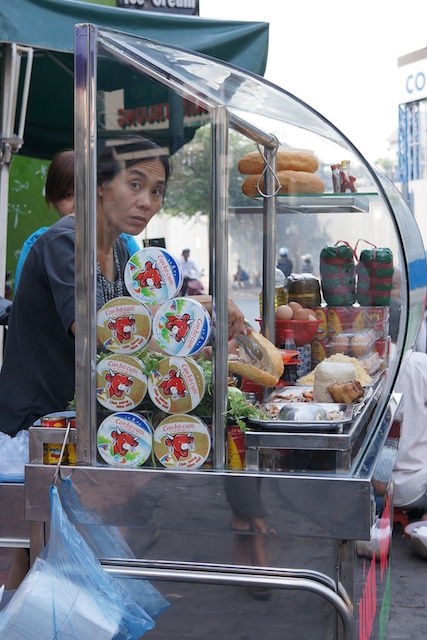
Bahn Mi lady in Hue, Vietnam. One of our regular breakfasts in Hue was a baguette, with cheese (triangles) and cucumber or egg – a bargain at about 25p each!
7) Wash Your Own Clothes
I don’t pay anyone to wash my clothes when I’m at home, why would I do it while on the road? Because we have so few clothes with us I wash them quite frequently. As we usually always have our own bathroom it is not a problem to just wash a few clothes in the sink. I use any old powder (which is very affordable) and hang things up on hangers or our travel washing line to dry. If we have a balcony even Henry’s thick cotton trousers will dry in a couple of hours. Laundry costs an average of $1 per kilogram. I estimate we would need to pay for 3 – 4 kg per week to be washed. That means savings on our trip so far of between $258 – $344 or £172 – £230!

Who would find hanging up the washing a chore with this view?
The other benefit to washing your own clothes is that they tend to last longer when you are the one looking after them. This means you do not have to replace them so frequently. You can attack stains straight away and you can be delicate with your delicates. We only had to send laundry away to be done a couple of times in India and both times they came back a little worse for wear (although very clean!) I think it is to do with the brute force method of thrashing the dirt out of the fabric.

Dhobi Ghat – the biggest laundry in the world where dirt is beaten out of the clothes entirely by men
8) Curb Alcohol Intake
Drinking booze costs more than drinking water and usually more than soft drinks too although that is not always true of local beer. If you are on travelling long term then you can’t really justify drinking every night to excess. It can be tempting and we’ve had our fair share of nights out, but nights out not only mean you are shelling out cash all night for drinks but you are more susceptible to buying extra food etc when you are under the influence too. See point 2: if you like your room you won’t feel the need to go out every night. Long term travel is nomadic living but abroad, not a ‘holiday’.
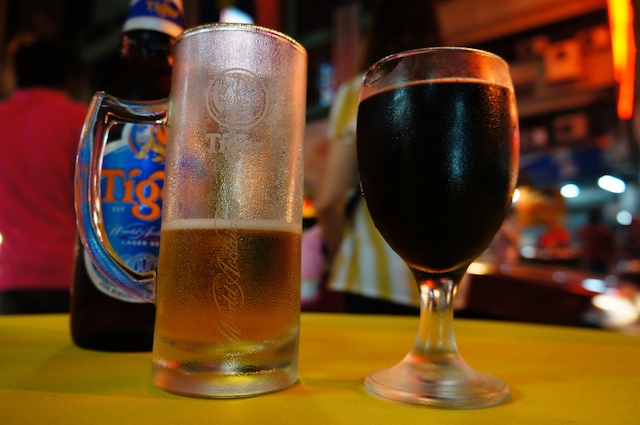
This was taken in Kuala Lumpur where alcohol is quite expensive and yes, the red wine was served chilled!
9) Eat Less Meat

Honey glazed heads for sale in Phnom Penh, Cambodia
Eating meat with each meal is expensive. There are often many delicious vegetarian options to choose from and even Henry, the great meat eater, is now converted to the joys of a well cooked piece of tofu. India was probably the best place we’ve visited to be a vegetarian, we sometimes went days without eating any meat there without missing it at all. We also eat eggs more frequently now than we did at home. I had no idea how much of a staple eggs would become but now I can’t describe the loveliness of a perfectly cooked egg with a rich yellow runny yolk topping off my rice. Eggs are a great source of protein, they’re cheap and I’m pretty sure most of the eggs we’ve been eating have not come from unhappy cooped up hens.
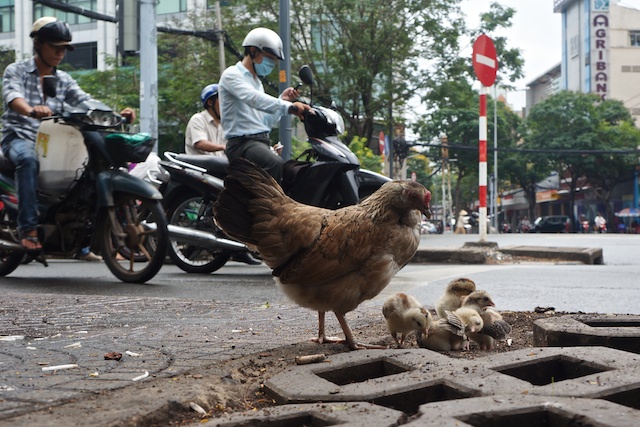
These chicks are not bound for a life in a cage – HCMC 2013
10) Don’t Feel Pressured to See Every Attraction
Not every tourist attraction is a ‘must see’. Sometimes it seems that it has been decided that a certain temple should have an entrance fee but there is one around the corner that is almost identical, and free! If you decide that everything on ‘the list’ that you found online or in a guidebook must be visited and ticked off then your days may well become repetitive and, depending on the country, you will soon be ‘templed out’.

Ta Phrom (location for Tomb Raider filming) was part of the Angkor temple complex that I didn’t want to miss
Sometimes there are things that cost money and that you will want to see. For me, the temples at Angkor Wat were one of those things. It cost $20 US each for a one day ticket – way above our daily budget – but, I think it was worth it. We have not always felt the same about entrance fees to other places. As I mentioned in point 3, it is the things you see in between and the people you meet that make a place memorable, not necessarily the ‘big ticket’ attractions that adorn the covers of the guidebooks.

Another moment we would not have had if we’d been rushing around – Henry showing some school children photos of themselves in Siem Reap, Cambodia
So, those are my top 10 ways to save money while travelling, I hope you enjoyed it! Have I missed any? Let me know your money saving tips for travel in the comments section below.
5 thoughts on “Top 10 Money Saving Tips for Long Term Travel 2013”